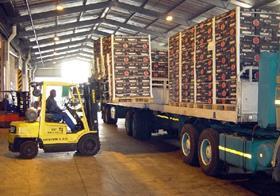
The South African fresh produce industry faces prolonged disruption of its export programme if the South African transport workers’ strike continues beyond this weekend.
Exporters are scrambling to get space on conventional reefer vessels because the country’s container port terminals have all ceased operations due to the national transport workers’ strike which started on Monday (10 May).
Two logistics service providers are reported to be chartering extra vessels which are due to arrive next week to move fruit originally destined for container shipments to overseas markets.
Although the conventional reefer terminals are not directly affected by the strike, they have to cope with logistical problems due to additional volumes which are being diverted from container terminals.
Unwanted diversion
Latest reports suggest that some container shipments are being taken to Walvis Bay in Namibia, a distance of close to 2,000km from Cape Town, where a container vessel will load from Sunday.
“We have ten containers on the way to Walvis Bay,” said Hein Smal of Arisa, the exporters of Sharon Fruit from South Africa. Mr Smal revealed his company had originally intended loading 30 containers from Cape Town this weekend. “We want to see how the shipment through Walvis Bay goes before committing more volumes.”
GoReefers’ CEO Delena Engelbrecht confirmed that the company is chartering an additional vessel to both Europe and the Middle East, which is due to load next week. “The problem is that the multiplying effect of this strike will be with us throughout the season because we are now moving into the peak shipping season which normally produces a shortage of shipping space,” she said.
Container vessels which are due to load in Cape Town and Durban are reportedly waiting outside the ports and are likely to berth only once the strike is over. “It is also likely that some of these vessels will continue their voyages because they have schedules to maintain,” added Ms Engelbrecht.
Avo aggro
South Africa’s biggest avocado shipper, Westfalia Estates, said it had temporarily stopped picking and packing. “We have enough fruit on the water to service our programmes, but we may encounter problems with continuity of supply if the strike continues next week,” commented Zach Bard of Westfalia Marketing.
“The latest news seems to indicate that the strike will not end soon,” said the CGA’s Justin Chadwick in a letter to the citrus industry. “Some people predicts that it could possibly be two weeks before settlement, others say it will be over by the weekend. This is poor timing as the citrus industry gets its export programme started and exporters want to take advantage of the window of opportunity between the northern and southern hemisphere seasons.”
Mr Chadwick also said that there seemed to be sufficient coldstorage capacity to last until the weekend, but predicted that if the strike went into next week then the port would become congested and fruit would start backing up.
“Maputo does give an alternative and already one ship has called for the north-west continent. Hopefully the parties will find each other and activities return to normal without too much delay.”
Container vessels destined for Europe normally load in Cape Town over the weekend and sail on Sundays. Exporters were hoping that operations would return to normal by today (Friday, 14 May) when the stacks were closing. “It now seems unlikely that any fruit in containers will be loaded this weekend,” commented one logistics service provider.
Cold comfort
Coldstores at the conventional terminals in both Cape Town and Durban, where the operators also have commitments for shipments to special markets which have strict protocols, were reported to be running at capacity.
GoReefers said plans were afoot to move more containers through the port of Maputu. “Wherever we can in South Africa, we are filling containers and get them ready for shipment so we can get things going again once the strike ends. By doing this we are hopefully alleviating pressure on the cold rooms,” revealed Ms Engelbrecht.
A new supply chain management company which has recently been established by apple exporter Tru-Cape and its shareholders was reported to be also considering chartering a conventional vessel. “The problem,” said one source “is that any additional vessels will probably not be able to berth in Cape Town before the end of next week at the earliest. Several vessels loading for Russia are due to load next week.”
There has for some time now been a debate in South African fresh produce circles that the industry has become too dependent on containers as the mode of shipping. More than 80 per cent of all fresh fruit exports are shipped in containers and this now represents a massive risk for the industry in the light of the strike. The only sector of the export industry where conventional reefer vessels still dominate is shipments of summer citrus to the US.
“We use containers mainly at the start and end of the season, or for very specific customers,” said Joretha Geldenhuys of the Western Cape Citrus Producers’ Forum. She said fruit that would have been shipped from Cape Town this week, and next week, on container vessels were being rescheduled on the first conventional reefer vessel of the season due to sail around the 27 May.



